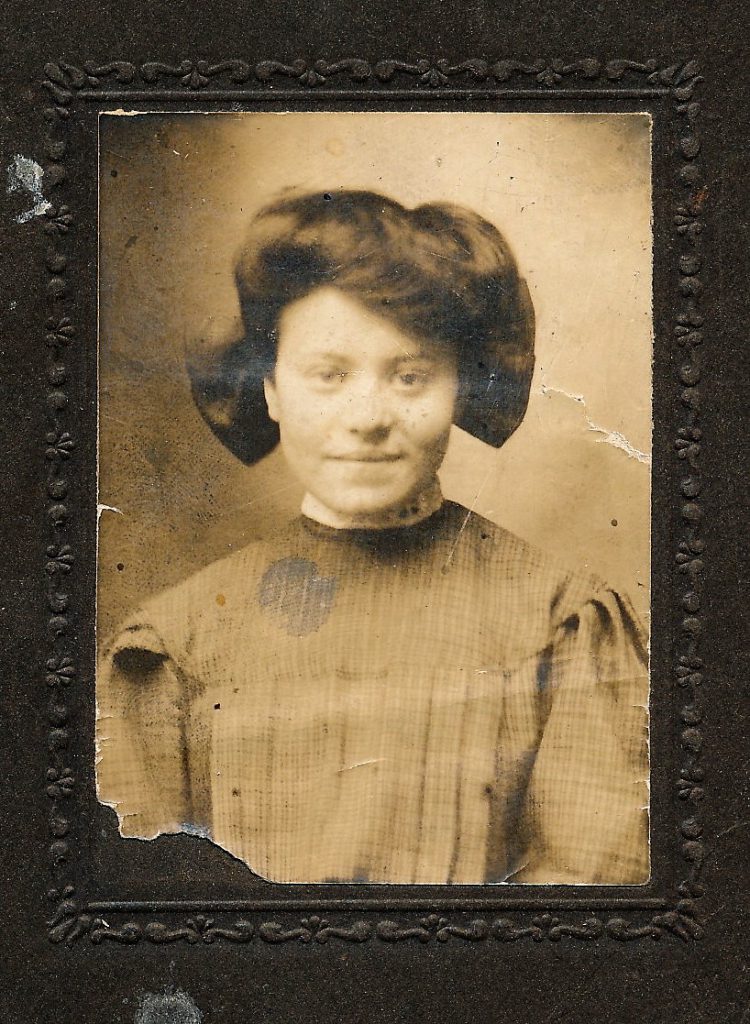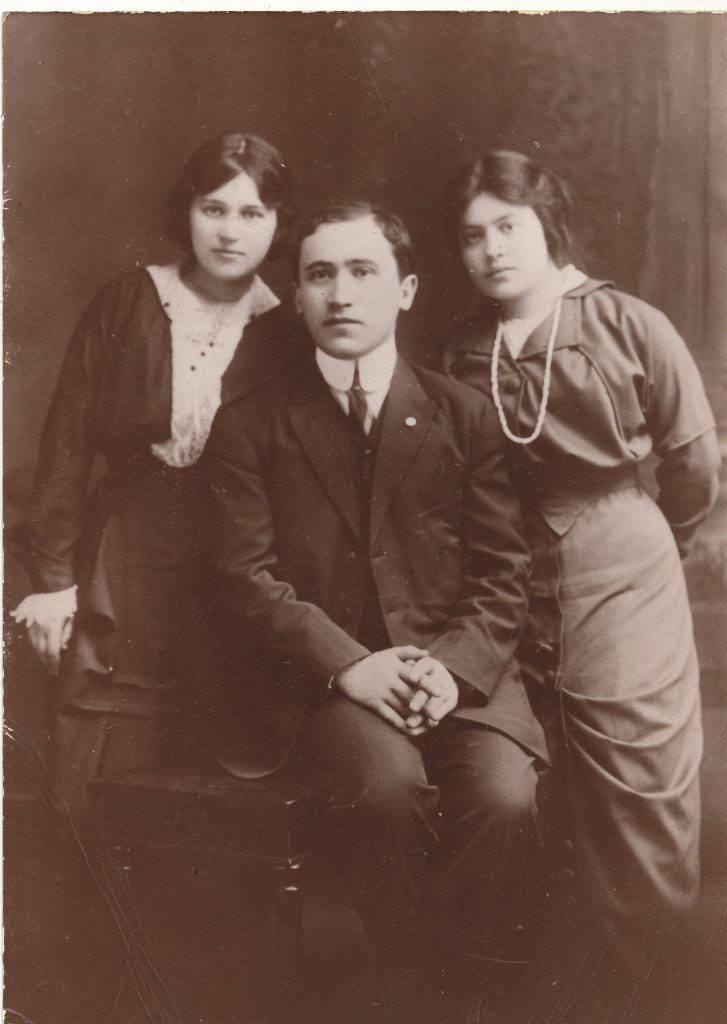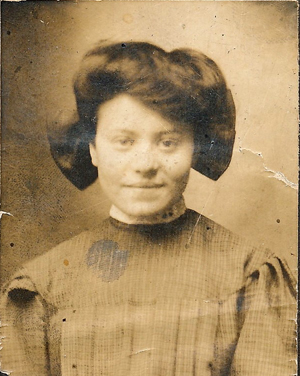by Marilyn Goldenberg Gelber
It stayed with me all my life: the story my grandmother told me of her first day in America.
My father’s mother, Taube (Tillie) Wolfson Goldenberg, was probably 11 years old in 1904, when she came by herself to America, on a ship whose name I never knew. Her widowed mother and four siblings remained in Rimalov (Grzymalow/Hrymayliv), a town near Tarnopol — at that time in the Galician part of the Austro-Hungarian Empire, later in Poland, and now in Ukraine.

Tillie was a small child who grew up to be a small adult — most likely from malnourishment in childhood. She went to work at the age of eight, sewing in a factory after her father died. After learning about the Kishinev pogrom, Tillie’s mother sent her away to some relatives in America.
Tillie thought her uncle was supposed to meet her at the dock, but he wasn’t there when she got off the ship. She stood on the dock, alone, not speaking any English, and holding a piece of paper with her uncle’s address. She didn’t know what to do or where to go. Anything might have happened — more likely something terrible.
As she told me the story, “A black man came along. I had never seen anyone with dark skin before. He read the address on the paper and took me by the hand to my uncle’s house — I can never be prejudiced against black people or understand people who are prejudiced.”
In 1904, the man who rescued my grandmother might very well have been born a slave — and most certainly was born in the era of slavery or shortly afterwards.
This was all I knew of the story, and it seemed destined to be all I ever would know, before the advent of the Internet, Ancestry.com, and JewishGen.
Sixty years after I heard about my grandmother’s arrival, and after much research on Ancestry.com, I found the manifest of the Haverford, the ship on which she had traveled. I had previously spent a long time looking fruitlessly on the Ellis Island website, before it came to me from my dim memories that she was the only one of my relatives whose entry point had been Philadelphia, not New York.
Her name had been transcribed in the Ancestry.com records as “Janbe Wolfezan” on the Haverford departure list and as “Taube Wolfszain” on the passenger manifest, which made her almost impossible to find. In the tiny handwriting crowded into the line with her name, the ship manifest indicated that it was “Expected” that Tillie would be “met by uncle Albert Stern at the wharf”. It was almost uncanny to see my grandmother’s story from the perspective of the time before it happened – and to see her expectation of her uncle’s arrival confirmed.
Now I had a clue: her uncle’s last name was Stern. This was a name I didn’t recognize from family stories or photographs, so I didn’t know exactly how he might have been related to her. At that time, the term “Uncle” was not reserved only for the brother or brother-in-law of a parent. For example, a parent’s first cousin might be called “Uncle” as a sign of respect.
And then a startling coincidence — there was someone on the JewishGen Family Finder page for the town of Hrymayliv who was looking for families named Wolfson and Stern.
This was Mark Alsher, a translator and teacher of Yiddish. In our email correspondence, Mark recognized the first names of my grandmother and her four siblings from stories his own grandmother had told him.
We were able to determine that our grandmothers were first cousins. “Uncle Alber Stern” was Mark’s great-grandfather, Alter Stern. Alter’s wife, Sarah Wolfson Stern, was the sister of Tillie’s father.

Gertie & Nathan
Mark and I are third cousins, and we share an interest in genealogy and in the Yiddish language. He was able to translate the Yiddish inscriptions on the hundred-plus-year-old postcards and photographs that I had inherited from my father — one of the photographs he recognized as a baby picture of his own father.
We never did find out why Uncle Alter wasn’t at the wharf, but Mark helped to solve another mystery. Another of the photographs was of an old man with long side-locks, a dreamy facial expression, and shoes that showed the effects of a pilgrimage. On the reverse side, the studio was identified as “Selim Cohen, Photographe [sic], Saffed (Palestine).”
My father had told me that his mother’s grandfather had left the family in Rimalov sometime before 1900 and gone to Safed (Tzfat), where he died. My parents looked for his grave when they were in Safed in 1971, but they never found it. I think they were looking for someone named Wolfson, Tillie’s father’s father. But Mark knew that it was not someone from the Wolfson family — he would have heard about it from his grandmother if it had been. So now I think that the photo was of Tillie’s mother’s father, whose last name was Nissenbaum or Nussbaum, although I still haven’t been successful in finding his grave in the various Jewish burial records.
Mark also kindly introduced me by email to several other Wolfson-Stern descendants, who were glad to know of a new relative. I have been attempting for several years to determine the genetic haplotypes of all my great-great-grandparents, by testing their descendants in the male or female line with 23andMe. With the help of a female first cousin of Mark’s, I was able to find out the maternal haplotype of our shared great-great-grandmother.
What a surprise to find a whole family of long-lost relatives — thanks to JewishGen.
September 2019
La Jolla, California, USA
Research Notes and Hints
Marilyn could not find her grandmother’s ship passenger log on the Ellis Island database. Later she recalled that her grandmother had arrived at the port in Philadelphia, not New York, and she found the departure list and the ship passenger manifest on Ancestry.com. See line 11 of the manifest.
Passenger lists are helpful tools in family history research. As Marilyn experienced, however, we need to keep an open mind when searching for or relying upon them. Sometimes the spelling of surnames or other information may be incorrect. The clerks who completed these records wrote down what they heard the passengers say, often passengers who didn’t speak the same language as the clerks. Sometimes the person indexing the handwritten documents might have misread the clerk’s handwriting. In Marilyn’s case, the passenger records offered several anomalies. Her grandmother’s age was listed as 10, when she was probably 11 at the time of the voyage, her surname was spelled differently on two different passenger records and, on one indexed record, her given name was unrecognizable. Her grandmother never lived in the town listed as her last residence, the address of her destination in Philadelphia was changed on the manifest from Spruce Street to Race Street, and the handwritten note about her uncle was difficult to read.
Marilyn’s breakthrough came as a result of a previously unknown third-cousin’s posting on JewishGen’s Family Finder. If you haven’t already posted your ancestral towns and family surnames on Family Finder, we encourage you to do so.
Information about Hrymayliv, Ukraine, can be found on the JewishGen KehilaLinks webpage and the JewishGen Communities Database.
Information regarding the Kishinev pogrom mentioned in Marilyn’s story can be found here: Kishinev Pogrom
